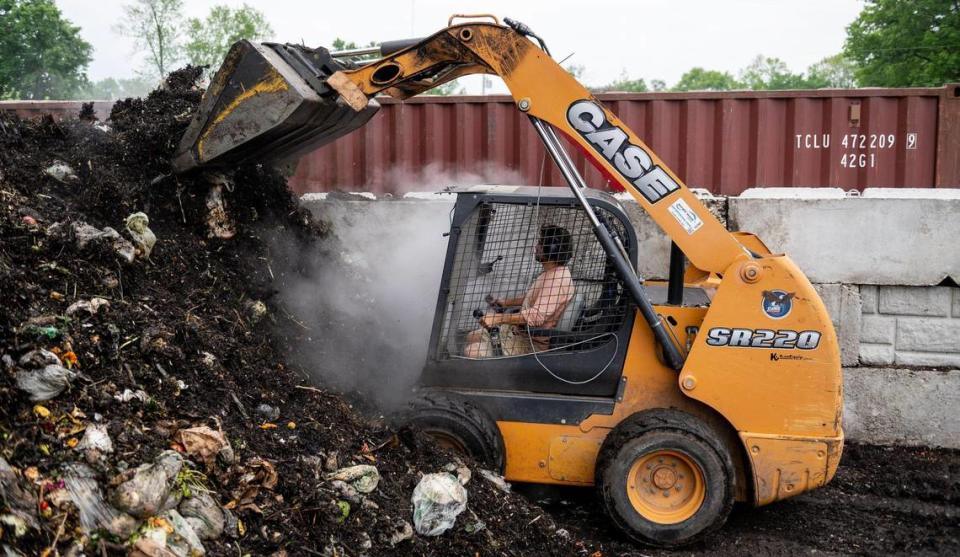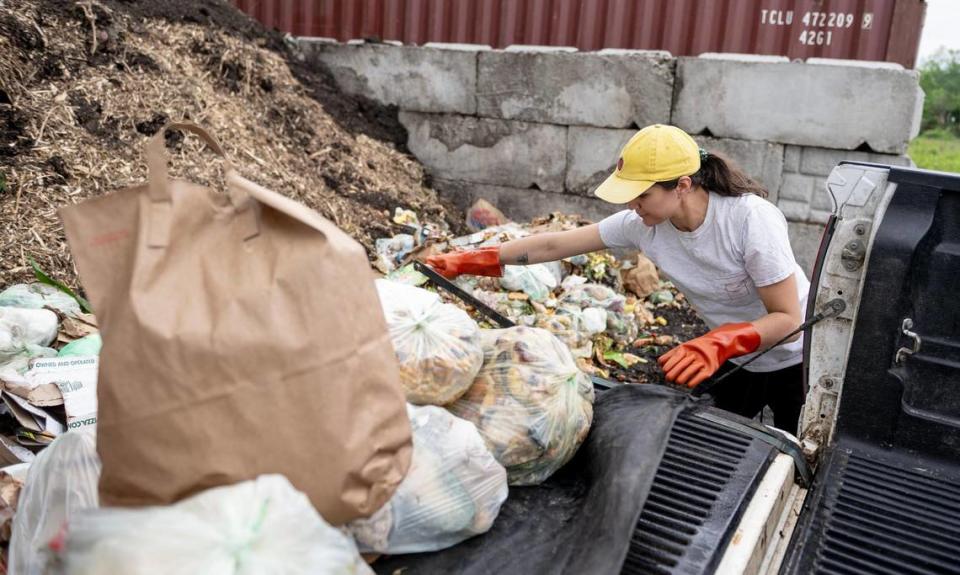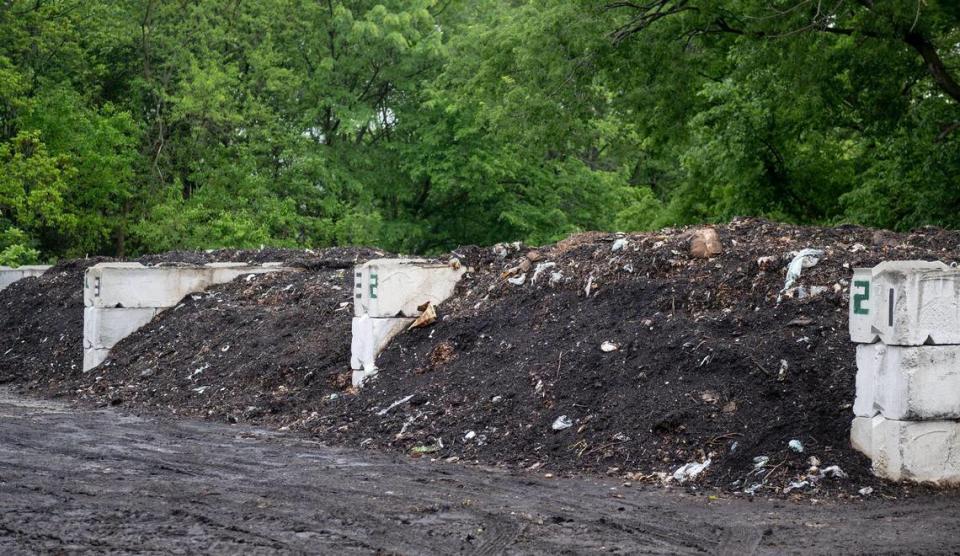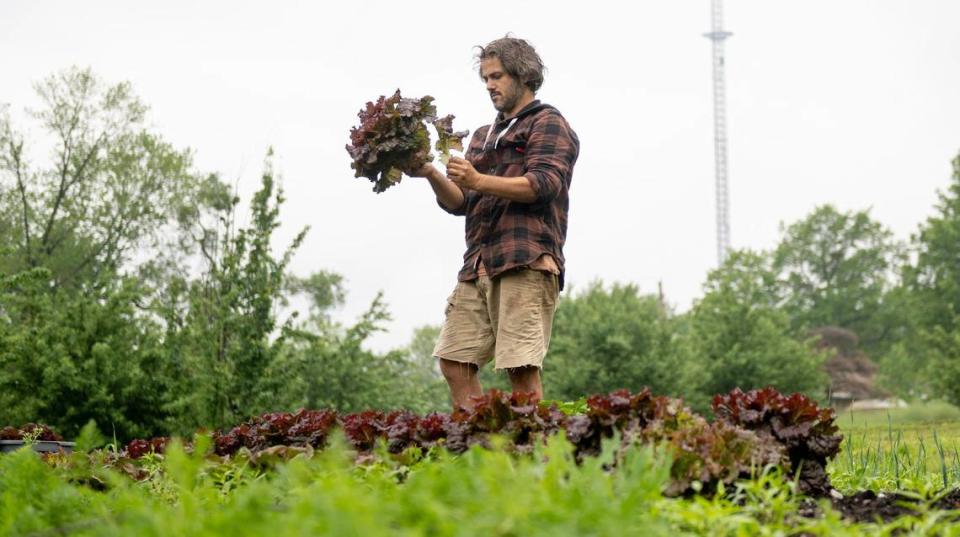KC urban farm aims to save the planet. Neighbors call it a nuisance, city cracks down
Brooke Salvaggio dug her calloused hands into a pile of freshly cured compost and held it up to the sun. She gazed in wonder at the black soil.
“Everything in here was once food waste,” Salvaggio said, the compost slowly draining through her fingers. “And now it’s this incredible microbial living substance that does wonders for growing food.”
“The spinach we’re growing lately is so much better than anything we’ve ever grown here, even in the midst of a horrid drought,” added Dan Heryer, Salvaggio’s husband. “And it’s because this is the first year we’ve had the benefit of all this compost being applied to our fields.”
Salvaggio and Heryer have been practicing all manner of sustainable agriculture at Urbavore Urban Farm since purchasing the 13.5-acre property on Kansas City’s East Side in 2011. But a few years ago they leveled up, taking out a large loan to purchase Compost Collective KC, a curbside compost service. They now own a fleet of trucks that weekly hauls food waste from more than 3,000 households back to Urbavore, where their composting facility turns what would otherwise be landfill-destined trash into nutrient-rich soil. Last year, they took in over a million pounds of food waste.
Lately, though, their agrarian success is bearing bitter fruit. Earlier this month, they were slapped with four code violations by the City Planning and Development Department that suggest the city believes their operations violate their zoning.
Lurking behind this effort, the couple believe, are a handful of neighbors who have spent the past few years calling the city with what they say are baseless complaints against them.
“It’s a ludicrous witch hunt to dismantle our compost facility and climate-positive (farming) initiatives,” Salvaggio said.
“Nobody has a problem with the farm itself,” Carrena Moultrie, one of Urbavore’s neighbors, countered in an interview with The Star. “I want them to succeed and flourish. But they chose to move to a residential area. They chose to have a farm in the middle of all these houses. And now they’re running dump trucks and 18-wheelers and causing traffic on our quiet street. And that’s just not the way it’s supposed to be in a neighborhood like this.”

Bought the farm
Navigating the bureaucratic maze of Kansas City’s zoning laws isn’t a new challenge for Salvaggio and Heryer. Before they started Urbavore, they ran Badseed Market, a Crossroads-based storefront farmers market stocked with vegetables they grew on a couple of acres near Bannister and State Line roads.
In 2010, neighbors unappreciative of the couple’s backyard livestock began to raise concerns about their operation. The city got involved and issued some zoning violations. One was for selling food on their property through Community Supported Agriculture (CSA) subscriptions, where customers buy a portion of a farm’s harvest in advance and typically come by weekly to pick up their bounty of produce.
“It got really ugly and resulted in some very heated public hearings,” Salvaggio said.
The controversy also brought about some changes to local regulations that eased restrictions on operating an urban farm — which back then was still a rather novel undertaking.
“It was a win for the urban ag community, but a loss for us personally,” Salvaggio said. “We ended up leaving our little farm because there were (still) too many restrictions.”
To accomplish their agricultural goals, Salvaggio and Heryer felt they needed more space and more of a buffer from the neighbors. They found such a property the following year: 13.5 acres at 5500 Bennington Ave., about a mile south of LC’s Bar-B-Q, just west of Interstate 435.
The land had sat dormant for more than a decade, following a failed attempt by a city-affiliated nonprofit to develop low-income housing on it. The city spent thousands in taxpayer dollars every year to mow and maintain the grounds.
“We approached the city and sprung ourselves into an insanely bureaucratic process to try to build an urban farm on land that was sucking resources instead of giving back,” Salvaggio said. “We had to do community engagement and door-knocking both for the purchase of the property and to get it rezoned for agricultural use. We had a proposal with slideshows laying out, from the beginning, that we were going to do community composting, have livestock, grow food and crops and sell them on site.”
In the end, they got their farm. The Board of Zoning Appeals recommended a rezoning, and the City Council signed off.
“The BZA said it was the first time in the city’s history that anyone has ever downzoned a property to make it less valuable,” Salvaggio said. “Our point was that it just depends on what you value.”

Growing up
Urbavore is now the largest urban farm in Kansas City.
“It’s one of the longest-running and most visionary urban farms we have,” said Ami Freeberg of Cultivate KC, a local nonprofit that promotes urban agriculture and nutritious food. “Brooke and Dan have really been walking the walk about things like no-till farming, limited water use, limited use of plastics, and soil health since well before those things were mainstream.”
The couple live on the property in a passive solar home that sits in the belly of the earth. The roof has a foot of soil on it; inside, a gray-and-black water recycling system converts their waste water, including urine, into potable water.
They grow all kinds of crops at Urbavore. Blueberries, strawberries, tomatoes, eggplant, potatoes, garlic, green onions. There are pear trees and apple trees. There is an insectary garden filled with native plants and wildflowers. They have hundreds of chickens and 17 pigs, which they rotate around the grounds every few weeks in a pasture-based system that better preserves the soil beneath them.
Salvaggio and Heryer had long sold their food at local farmers markets. But during COVID-19, they started posting their offerings online. Now, instead of hauling all those fruits and veggies to a market every week, approximately 100 customers come to them, picking up orders at the farm entrance on Thursdays between 4 and 7 p.m.
They also purchased Compost Collective KC during the pandemic, in 2021, increasing the traffic along 55th Terrace at Urbavore’s south entrance.
These two new developments are part of what has drawn the ire of the neighbors.
“It is degrading our residential community,” said Leah Suttington, who lives across the street from Urbavore’s south entrance. “This is a dead-end street with several families who appreciate the peace and quiet and whose kids can’t play outside anymore because of all the cars and dust and emissions and speeding. There’s not supposed to be this kind of commercial traffic in a residential area.”
Moultrie blames an increase in snakes and rodents on the farm and its composting facility. Two other neighbors, whom The Star couldn’t reach for comment, have also called in complaints to the city in recent months regarding the odors emanating from the compost facility and the livestock.
But city inspectors who came out found no violations on that front. The Star did not detect any strong odors from the composting facility or the farm, either, on a visit to Urbavore last Saturday.

Violations
A visit from a City Planning and Development inspector last month did yield four violations for Urbavore, though:
▪ Shipping containers: Several shipping containers on Urbavore’s property are being used for storage, which the farm’s zoning does not permit.
▪ Gravel driveway: The law requires driveways on properties of at least three acres to be paved for the first 25 feet from the right-of-way. Neither of Urbavore’s two driveways — on 55th Terrace and on Bennington — are paved.
▪ Retail sales: Urbavore is allowed to sell the food it grows to customers who line up on Thursdays for its CSA pickup. But lately Urbavore has also been functioning as a distribution point for other local food growers and makers, whose offerings customers can order on Urbavore’s website. That is not allowed, the city says. They are allowed to sell the food they grow there, but cannot sell food from other farms and businesses on the property.
▪ Composting: The city says Urbavore needs a special use permit to operate a composting facility of more than 40 cubic yards.
Urbavore has appealed all four violations with the Board of Zoning Appeals. But it is the last violation, about their composting operation, that has Salvaggio and Heryer particularly concerned.
“We’ve invested $350,000 up front in this composting business,” Heryer said. “We would never have done that unless we got approval from the city and the state first.”
Heryer continued: “In 2021, when we first looked into buying (Composting Collective KC), I looked into the city’s composting code and it looked like it had changed since we’d started our original composting program in 2011. So I went to city planning to see if we’d be grandfathered in, or what. And that led to a pre-application meeting with the BZA where I specified where the new composting site would be, I had drawings, everything. And I expected a lot of red tape.
“But then they got back to me a few days later and told us we didn’t need to do anything and that our composting facility would be considered an accessory use to our urban ag use, as opposed to a primary use of the property.”
He supplied The Star with several documents that confirm that Urbavore was, in fact, told by the city that the expansion of its composting efforts was approved.
“The composting operation qualifies as an accessory use of your property, and therefore is regulated by, and compliant with, Section 88-305 of the Zoning & Development Code, as is the planned expansion as you’ve described it,” city planner Jared Clements wrote to Urbavore on March 24, 2021.
That letter came after a March 2, 2021, meeting in which Urbavore’s proposal to expand its composting efforts to an annual volume of 1,500 cubic yards was outlined in a Zoom invitation.
Sherae Honeycutt, spokeswoman for the city, said the recent composting violation was issued because, “With the scope and volume of the composting operation, this has become a primary use of the property.” Asked how the city determined that Urbavore’s composting facility had been reclassified as a primary use of the property, Honeycutt did not offer any specifics, saying only, “This is determined by the Investigator with evidence gathered related to the governing code and reviewed by staff.”
Heryer said that the bait-and-switch from the city on their composting facility is likely headed for the courts unless the BZA violations are dismissed on appeal.
“We have 12 full- and part-time employees between the farm and the composting collective,” Heryer said. “They rely on us to be able to do this work. We need to continue operating to pay our debts and to provide the livelihoods for these people. So for the city to go back on its word after we’ve invested so much, if that’s the case, then I think we probably will need to pursue a lawsuit.”

What’s next?
The BZA has not yet docketed Urbavore’s appeals. For now, the farm and composting facility are fully operational. Urbavore has lately been asking its Thursday customers to stagger their arrivals, in an effort to minimize traffic on 55th Terrace.
“But we still had one of our neighbors last week parked at the top of the hill, evil-eyeing our customers, counting cars, writing down what states the license plates came from, and taking photos,” Salvaggio said. “It has made my customers feel threatened.”
Moultrie, one of the neighbors, said she has felt a bit threatened herself by Salvaggio’s social media posts about Urbavore’s current issues.
“Brooke says she’s feeding the world with her food — OK, fine,” Moultrie said. “But she’s also inciting aggression against us from her customers, many of whom are coming to this neighborhood from Johnson County. The things she posts on her Facebook are not conducive to a positive neighborhood feeling. I think she should sit down and talk to her neighbors who are having the issues versus just voicing it on social media.”
Suttington, the other neighbor, has suggested what she views as a simple fix to the traffic issues: Urbavore should use Bennington Road as the primary entrance for customers and compost trucks. “They already used to have their produce stand down there,” Suttington said. “There’s plenty of space for their customers to park there when they have events.”
But Heryer and Salvaggio said it would cost too much on their strapped budget to pave their Bennington entrance and improve the street front area on the east end of their property. They have asked the city to implement improvements — curbs, sidewalks and street parking — that would alleviate some neighbors’ concerns but say they haven’t received a response.
“Dan sends emails out and it’s like they disappear into thin air,” Salvaggio said. “Meanwhile, the neighbors complain and the next day there’s somebody from the city out here.”
Freeberg with Cultivate KC said the city’s recent targeting of a self-sustaining organic farm like Urbavore seems at odds with the Kansas City Regional Climate Action Plan, which the City Council passed last year.
“Two key aspects of that plan are food waste reduction and producing more food locally, both of which Urbavore is doing a great job of,” Freeberg said. “So for the city to be saying these are important values and then at the same time undermining the work being done in the community that supports that, it doesn’t really make sense.”
Honeycutt with the city disputed that characterization.
“There is no effort by the city to ‘clamp down’ on urban farms,” she said. “As complaints are received, they are investigated accordingly.”

